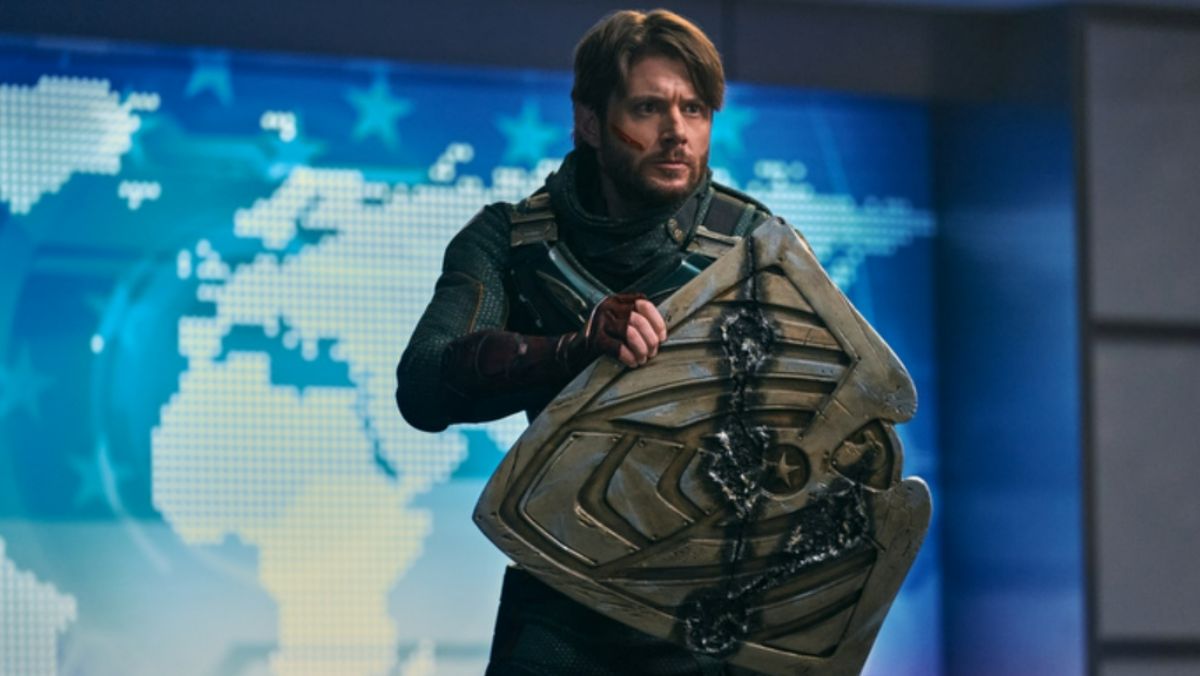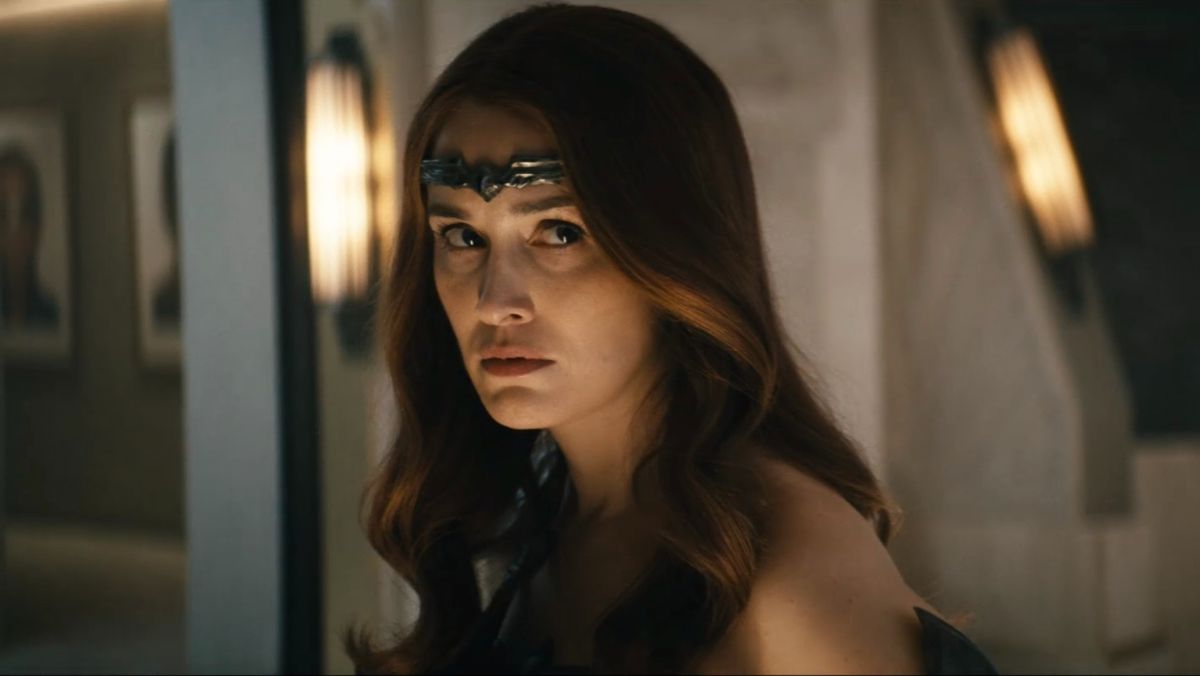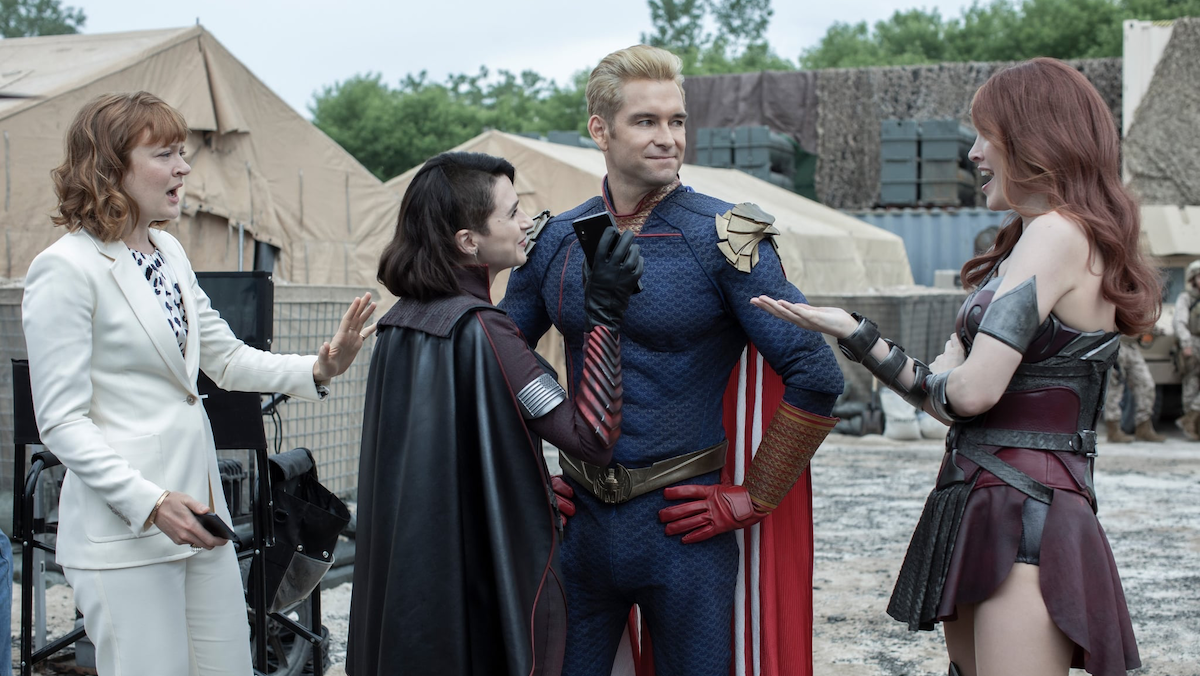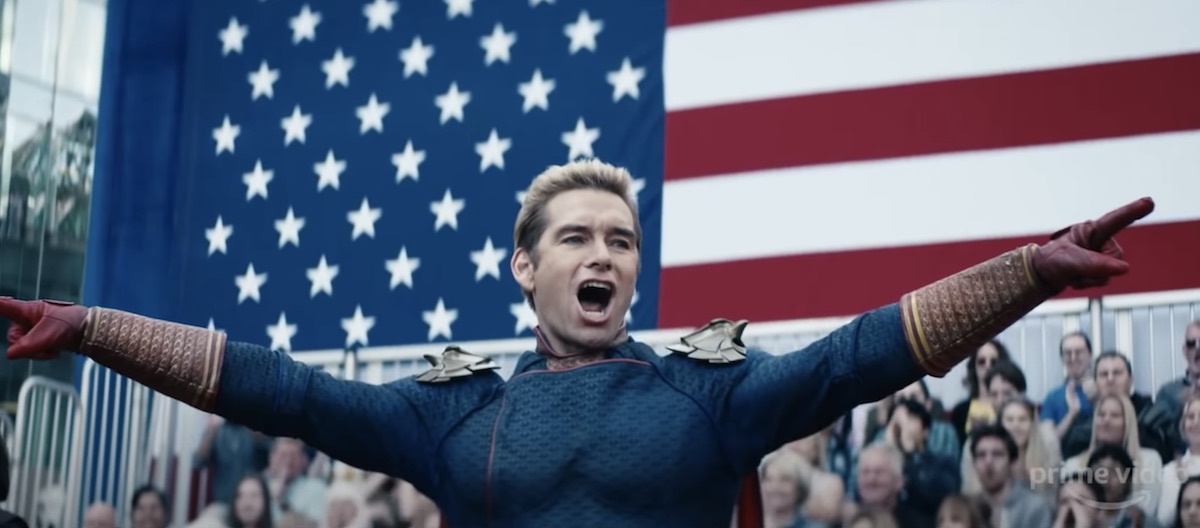The Boys’ writers have managed to raise the stakes (and gonzo gore) with each season. And they’ve also come down harder on white Christian nationalism each passing year, brandishing their acerbic wit. For those who don’t know, white Christian nationalism is a movement founded upon the belief that the U.S. is a kind of “promised land” from God, established by protestants for protestants. The OG subscribers of replacement theory, these proponents are terrified of “The Other,” and often especially perceive racial minorities as infringing upon their God-given, white Anglo-Saxon Protestant (WASP) dreamscape.
The show’s creators have intentions that seem poignantly synthesized in the gravelly words of one of my favorite season three additions, the Stan Lee-adjacent character known as The Legend. “Being American means knowing you’re the hero,” he tells Hughie while smoking a cigar. “So what do we do? We sweep our filthy shit under the rug and we tell ourselves a myth like Soldier Boy.”

The Boys‘ Characters and Their Societal Reflections
One way the writers critique this specific mentality is in their constant portrayals of the cut-throat (laser-throat?) underbelly of capitalism. Vought has only ever been an über greedy corporation that long ago traded its moral compass for a spreadsheet that calculates a person’s monetary potential. And knowing the buying power of middle America, Vought opened the series pilot by procuring Starlight.
She’s a white, blonde, corn-fed girl from Iowa who demurely describes herself as “five-foot-six and 110lbs” in her Seven interview tape. Thus, it was no surprise this season when Homelander finally coerced Starlight into playing a couple. Her social image is the perfect yang to his all-American, Superman-ish yin. Meanwhile, bisexual, brunette, and sword-wielding Maeve was always going to be mere fodder for the leftist youth of The Boys universe. She is Vought’s compromise to prevent cancellation and budding feminists’ incentive to buy Vegetarian Pride Lasagna.

Which brings us to Dean Winchester—erm—I mean, Soldier Boy. (Anytime someone said his name this season, my brain immediately went to Soulja Boy’s “Crank That.” Anyone else? No, just me? Coolcoolcool.) This season’s walking MacGuffin is a literal Reagan Era relic, complete with the whole surly “Marlboro Man act,” as Hughie calls it. After being freed from one of those damn commie laboratories, he finds himself in a strange world where Vought actually cares about appealing to newbie feminists.
“Do men really walk around like that?” he asks after seeing a father toting his child in a baby carrier. Initially, his gruff, “Back in my day…” brand of xenophobia contrasts with Homelander’s PR-conscious two-facedness. But by the time we learn that the former unwittingly fathered the latter, the resemblance is uncanny. Soldier Boy and Homelander are both merciless psychopaths. In a parent-child reunion worthy of Jerry Springer, Homelander says that he’s just like Soldier Boy. “I know,” Soldier Boy grumbles in reply. “You’re a fucking disappointment.” *cue chair-throwing*
White Christian Nationalism Through Capitalism and The Boys‘ Classic Satire
Corporations may change the face they show the public but it’s always about the bottom line for them. Any researchers of white Christian nationalism will admit that a fervor for free-market capitalism is inextricably woven into its fabric. German economist Max Weber observed this connection way back in 1905 when he penned his now-famous work, The Protestant Ethic and the Spirit of Capitalism. The Boys obviously critiques capitalism through Vought; however, capitalism is just one of the facets of white Christian nationalism that this show tackles.

There are many in-your-face satirizations, like when racist Stormfront-lovers march with Tiki torches. It is a disquieting nod to the tragic 2017 “Unite the Right” rally in Charlottesville, VA where a counterprotestor was viciously mowed down. One can’t help but draw this comparison yet again during this season’s closing scene. Homelander murders a counter-protestor at a pro-Homelander (read: white Christian nationalist) rally.
Numerous shows entertainingly satirize hypocritical and xenophobic white Christians for laughs. In fact, The Righteous Gemstones is currently working on its third season of just such content. And The Boys does the same, from Ezekiel’s Believe Expo (a “Capes for Christ” affiliate) in season one to Starlight’s tribute song for Translucent. The latter sounds like it’s straight from Christian radio.
But what sets The Boys apart in its irreverence (besides, y’know, the giant penises, exploding heads, etc.) is its ruthlessness in some instances, as demonstrated in what follows the aforementioned Homelander murder. The counter-protestor’s lifeless body drops, there’s a beat of silence, and then… applause for Homelander.
Homelander and the Ideals He Upholds in The Boys
It seems that no matter how awful Homelander is, his supporters will continue to love him as long as he represents an ideal. Because that’s all that Homelander is: a walking conglomerate of jawline, blue eyes, ‘Murica, and fireworks that test groups responded well to. Although The Legend said that the myth Americans tell ourselves is Soldier Boy, it’s clear that Homelander is just the 2022 version of that same myth.
White Christian Nationalism (and most kinds of fervent nationalism in general) is built on myth-telling, and worshiping an idea—typically a nostalgic past that never quite existed. It’s a monument, built of words like grace, valor, freedom, liberty, and sacrifice. Evangelicals and white Christian nationalists aren’t interchangeable (some deplore each other); but they do overlap.
As Kristin Kobes Du Mez observes in her insightful book, Jesus and John Wayne: How White Evangelicals Corrupted a Faith and Fractured a Nation, many evangelicals’ language and practices indicate they uphold their evangelicalism in a position parallel to Jesus Christ. Thus, evangelicalism in and of itself has elevated to the position of myth. Similarly, white Christian nationalists in the U.S. do not worship the real America but an idea of America, a portrait of purity and patriotism. (Don’t look too closely, or you’ll see that it’s full of flimsy buzz words.)

Homelander fully embodies this kind of fallacious thinking. His personality is inhuman(e), engineered by a lab full of scientists directed by a boardroom full of suits. This is why when he yearns for the maternal love he never had. He of course reaches for the idea of it, guzzling breastmilk first and then—after he’s murdered his only source in Stillwell—cow’s milk. Perhaps he thirsts for milk also for its Biblical, honey-adjacent history that recalls the manifest destiny of white Christian nationalism. Regardless, there’s no quenching this thirst because he only ever chases after something that represents an ideal of what he needs.
So we see the crowds of supporters falling for someone who embodies their idea of America. He’s strong, speaks his mind, and doesn’t condescend to what’s politically (or morally) correct. And The Boys is unafraid to show a suburban husband’s stomach-churning descent into just such a Homelander-loving crowd. It’s ruthless in that it traumatizes us again and again by portraying powerdrunk villains mercilessly and unrepentantly eviscerating innocent people. Viewers see this from literally the opening scene of the show. This bloodshed is motivated by prejudice or—you guessed it—just because they can.
The Just Desserts of White Christian Nationalism
We witness horrible things like sexual assault and racist brutalizing. But The Boys is also ruthless in its just desserts. It stokes our anger into a bonfire until we think we can’t handle any more heat before giving us the ending that we all yearn for. The vengeful capitalist Madelyn Stillwell receives fatal LASIK from Homelander. Stormfront (a.k.a. “Nazi b***h”) is beaten by the woman who’s brother she killed, and then set to broil by Ryan’s lasers. The racist “Supes Lives Matter” loser, Blue Hawk, is road-rashed to death by A-Train. The Boys likely won’t help deprogram any white Christian nationalists. But for the rest of us who are in on the joke, this show is a balm to our weary souls.

